Stocks Lose Their Allure After the Japan Nuclear Meltdown
Stock-Markets / Financial Markets 2011 Mar 19, 2011 - 06:07 AM GMT

 "Chernobyl solution" may be last resort for Japan reactors
"Chernobyl solution" may be last resort for Japan reactors
(Reuters) That means the stricken complex is likely to become an open sore, leaking radioactive particles into the atmosphere, for weeks and possibly months before the Chernobyl solution could even be implemented.
Authorities say radiation outside the Japanese plant is not high enough to cause harm. Still, the 20 km (12 mile) exclusion zone around the plant may end up as a permanent no-man's land, a major problem for small, populous country. A 30 km (19 mile) exclusion zone remains around Chernobyl.
US Cost of Living Hits Record, Passing Pre-Crisis High
(CNBC) One would think that after the worst financial crisis since the Great Depression, Americans could at least catch a break for a while with deflationary forces keeping the cost of living relatively low. That’s not the case.
A special index created by the Labor Department to measure the actual cost of living for Americans hit a record high in February, according to data released Thursday, surpassing the old high in July 2008. The Chained Consumer Price Index, released along with the more widely-watched CPI, increased 0.5 percent to 127.4, from 126.8 in January. In July 2008, just as the housing crisis was tightening its grip, the Chained Consumer Price Index hit its previous record of 126.9.
Stocks lose their allure after the nuclear meltdown.
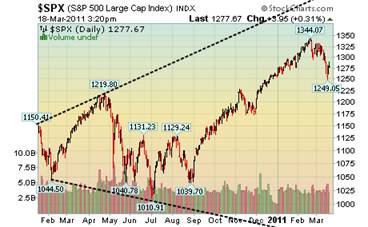 -- The Investment Company Institute has reported a $1.123 billion outflow from domestic equity funds last week. The loss of all gains in the market since the beginning of the year has raised the cautionary flags again. The nuclear meltdown in Japan has caused international money flows that may not have been anticipated prior to the accident. This is a time to exercise extreme caution.
-- The Investment Company Institute has reported a $1.123 billion outflow from domestic equity funds last week. The loss of all gains in the market since the beginning of the year has raised the cautionary flags again. The nuclear meltdown in Japan has caused international money flows that may not have been anticipated prior to the accident. This is a time to exercise extreme caution.
World crisis prompts a flight to safety in bonds, but troubles lie ahead.
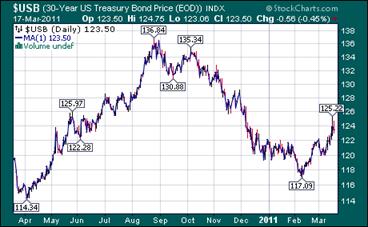 -- Sen. Michael Bennet (D., Colo.) Wednesday asked the Federal Reserve and Treasury Department to estimate the economic and fiscal consequences if Congress doesn't raise the ceiling on federal debt. Treasury estimates that the U.S. will hit its debt ceiling sometime between April 15 and May 31. Timothy Geithner has been pressing lawmakers to raise the ceiling with no strings attached, and both the Fed chairman and the Treasury secretary have warned that failure to raise the limit would have dire economic consequences.
-- Sen. Michael Bennet (D., Colo.) Wednesday asked the Federal Reserve and Treasury Department to estimate the economic and fiscal consequences if Congress doesn't raise the ceiling on federal debt. Treasury estimates that the U.S. will hit its debt ceiling sometime between April 15 and May 31. Timothy Geithner has been pressing lawmakers to raise the ceiling with no strings attached, and both the Fed chairman and the Treasury secretary have warned that failure to raise the limit would have dire economic consequences.
The search for liquidity trumps gold prices.
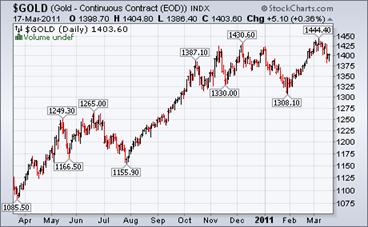 -- Last week we saw an indiscriminate selloff in both stocks and commodities. This may be an indication that liquid cash may be more desirable than hard assets. There is no direct line that we can draw between cause and effect. However, this last week gold joined equities in the selloff. There is good reason to believe that the rally in gold needs to take a rest.
-- Last week we saw an indiscriminate selloff in both stocks and commodities. This may be an indication that liquid cash may be more desirable than hard assets. There is no direct line that we can draw between cause and effect. However, this last week gold joined equities in the selloff. There is good reason to believe that the rally in gold needs to take a rest.
Japan has its own Flash Crash.
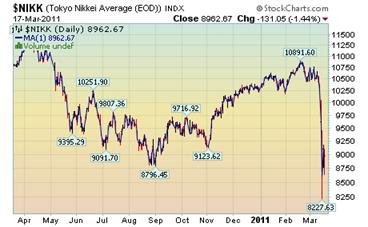 -- Japanese stocks climbed, paring their worst weekly performance since 2008, as the yen tumbled after the Bank of Japan and some Group of Seven countries said they began intervening in currency markets while the country battles to control a nuclear accident. The Nikkei 225 Stock Average rose 2.7 percent to 9,206.75 at the 3 p.m. market close in Tokyo. The Nikkei… has lost 10 percent this week, the biggest weekly slide since October, 2008.
-- Japanese stocks climbed, paring their worst weekly performance since 2008, as the yen tumbled after the Bank of Japan and some Group of Seven countries said they began intervening in currency markets while the country battles to control a nuclear accident. The Nikkei 225 Stock Average rose 2.7 percent to 9,206.75 at the 3 p.m. market close in Tokyo. The Nikkei… has lost 10 percent this week, the biggest weekly slide since October, 2008.
China still trying to curb inflation.
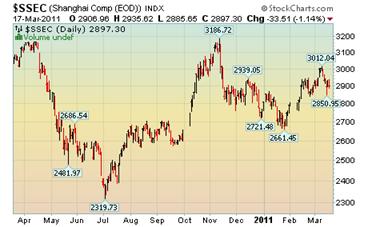 -- China ordered banks to set aside more cash for the third time this year, judging that inflation remains a bigger threat to the world’s second-largest economy than Japan’s earthquake and nuclear crisis. Reserve requirements will increase half a percentage point from March 25, the People’s Bank of China said on its website yesterday. The ratio will rise to 20 percent for the nation’s biggest banks, excluding any extra limits for individual lenders.
-- China ordered banks to set aside more cash for the third time this year, judging that inflation remains a bigger threat to the world’s second-largest economy than Japan’s earthquake and nuclear crisis. Reserve requirements will increase half a percentage point from March 25, the People’s Bank of China said on its website yesterday. The ratio will rise to 20 percent for the nation’s biggest banks, excluding any extra limits for individual lenders.
The Dollar is breaking out of its bullish wedge.
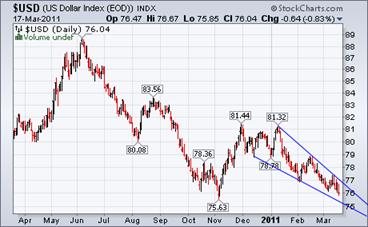 -- The yen rose sharply and U.S. Treasuries prices and stocks initially dipped Friday after an 8.9 magnitude earthquake in Japan caused nervous companies and investors to send funds back home. This has caused the yen to spike. This prompted an intervention by the G7 countries that has not been seen for at least a decade. This may build pressure in the currency markets to drive the dollar higher.
-- The yen rose sharply and U.S. Treasuries prices and stocks initially dipped Friday after an 8.9 magnitude earthquake in Japan caused nervous companies and investors to send funds back home. This has caused the yen to spike. This prompted an intervention by the G7 countries that has not been seen for at least a decade. This may build pressure in the currency markets to drive the dollar higher.
A shrinking labor pool means a shrinking demand for housing.
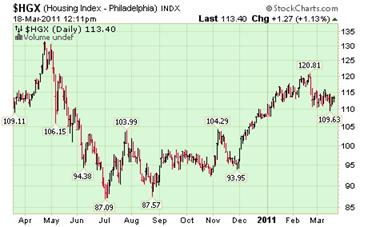 -- Points to Consider
-- Points to Consider
- The civilian population is steadily rising. However, none of that increase in recent years is looking to buy a home.
- Those not in the labor force are not looking
- Those unemployed are not looking
- Those afraid of losing their job are not looking
- Those in a house and underwater are not looking
- Those just out of school and deep in school debt are not looking
- Those facing retirement may be looking to sell or downsize
- Mortgage standards are much tighter for those who are looking (Source: Mish)
Gasoline Prices are still too high.
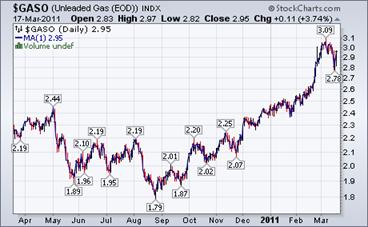 --The Energy Information Agency weekly report states, “The U.S. average retail price of regular gasoline added about a nickel versus last week. At $3.57 per gallon, the gasoline price is now $0.78 per gallon higher than last year at this time. All regions in the country saw gasoline prices rise this week, with the seven-cent increase on the West Coast leading the way.”
--The Energy Information Agency weekly report states, “The U.S. average retail price of regular gasoline added about a nickel versus last week. At $3.57 per gallon, the gasoline price is now $0.78 per gallon higher than last year at this time. All regions in the country saw gasoline prices rise this week, with the seven-cent increase on the West Coast leading the way.”
Natural Gas price increase is minimal.
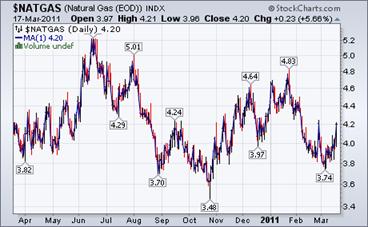 -- The U.S. Energy Information Administration reports, “As temperatures continued to warm in the lower 48 States this report week (March 9-16), changes in wholesale market prices were mixed, but in general quite minimal. With natural gas imports becoming less important to U.S. gas supply, events in Japan and continuing unrest in North Africa appear to have had little impact on the spot natural gas market to date.”
-- The U.S. Energy Information Administration reports, “As temperatures continued to warm in the lower 48 States this report week (March 9-16), changes in wholesale market prices were mixed, but in general quite minimal. With natural gas imports becoming less important to U.S. gas supply, events in Japan and continuing unrest in North Africa appear to have had little impact on the spot natural gas market to date.”
TEPCO Director Weeps After Disclosing Truth About Fukushima Disaster
(ZeroHedge) The Daily Mail has released a dramatic picture showing the emotional exhaustion of TEPCO managing director Akoi Komiri who is openly weeping as he leaves a conference to brief journalists on the true situation at Fukushima, following his acknowledgment that the radiation spewing from the over-heating reactors and fuel rods was enough to kill some citizens. "A senior Japanese minister also admitted that the country was overwhelmed by the scale of the tsunami and nuclear crisis. He said officials should have admitted earlier how serious the radiation leaks were.
Discovery That Indian Point Nuke Is Most Exposed To Quake Risk Prompts Reuters To Release An Evacuation Map
(ZeroHedge) According to a recent report from the Nuclear Regulatory Commission the California Diablo Canyon nuclear power plant (built in proximity to the San Andreas fault) which everyone always points to as the biggest earthquake risk in the US, is actually ranked 9th in the US in terms of earthquake risk (we somehow really doubt this). The top one? The same we wrote about yesterday as having had a leaking seal for the past 18 years according to the Union of Concerned Scientists - Indian Point in Buchanan, NY. Of course its proximity to New York City has immediately stirred cries of concern from the world's most banksterous city and demands for a shutdown by Andrew Cuomo. It has also prompted Reuters to release an evacuation map of the surroundings should "something" go wrong with Indian Point, an event which will likely only further instill a sense of soothing calmness and a "tranquility effect" in the New Yorker community.
Fed Confirms First FX Market Intervention In 11 Years As Effects Start To Fizzle
(ZeroHedge) And just as the Fed confirms its first direct currency intervention since 2000 (who knew NYU interns could multi-task so well between stocks, bonds and FX, incidentally today's POMO is a lethargic $1-2 billion monetization of TIPS), the USDJPY takes its first dip below 81 since the "Honda" Accord announcement last night. According to several sources the Fed spent 50 million in USDJPY purchases. Alas that will not be enough. And with the USDJPY continuing to leak lower, take back what we said about the multi-tasking efficiency of 25 year old FRBNY interns-*****-world tyrants in waiting.
Perhaps it is time to ask why Japan (and the central banking cartel) has spent almost half a trillion dollars to preserve capital markets instead of giving that money to the millions of earthquake disaster victims...
Plutonium, MOX, and Chicken Little
(Mish) Yesterday someone called me a "Chicken Little" regarding events Japan. This brave soul bragged about living near 3-Mile Island as if it was some sort of badge of honor, yet simultaneously admitting it was no big deal.
Events in Japan go far beyond 3-Mile Island and it is well beyond foolish to think this is no big deal. None of us knows how it will play out, yet this is a major crisis with the potential to be a Chernobyl-type disaster if a MOX reactor blows.
Please consider MOX fuel rods used in Japanese Nuclear Reactor present multiple dangers
The mixed oxide fuel rods used in the compromised number three reactor at the Fukushima Daiichi complex contain enough plutonium to threaten public health with the possibility of inhalation of airborne plutonium particles. The compromised fuel rods supplied to the Tokyo Electric Company by the French firm AREVA.
Plutonium is at its most dangerous when it is inhaled and gets into the lungs. The effect on the human body is to vastly increase the chance of developing fatal cancers.
One of the unique characteristics of mixed oxide fuel is that relatively little of the plutonium in the fuel rods is used up in the fuel cycle in a reactor. “When the plutonium in the fuel rods goes into a reactor for commercial power, a very little of it is going to be consumed. I don’t know what percentage, maybe half percentage or something like that, but it’s going to generate an extraordinary amount of contamination throughout the fuel rods…,” says William Lawler, an expert on radioactive waste.
Mike Krieger Asks What Is More Dangerous: Building Nuclear Power Plants On Major Fault Lines Or Allowing Central Bankers To Play God?
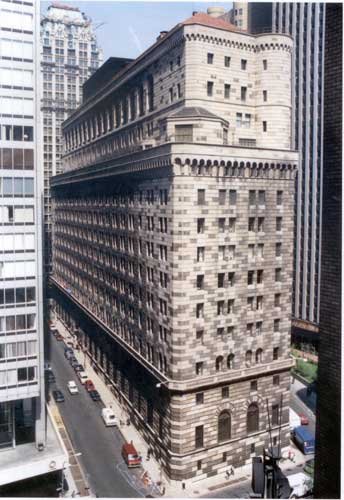 (ZeroHedge) What is more dangerous, building nuclear power plants on major fault lines or allowing Central Bankers to play God?
(ZeroHedge) What is more dangerous, building nuclear power plants on major fault lines or allowing Central Bankers to play God?
Rather than comment on how bad Japan is or will be I am going to focus on the massive monetary fault line we are all sitting on at the moment. While the epicenter of this earthquake is at 33 Liberty Street in Manhattan, this quake will wreck havoc on all of the planet’s six billion people and unlike the Japan earthquake this one will be entirely a manmade affair. For those unaware, 33 Liberty is the building that houses the Federal Reserve Bank of New York and for those that have never seen the building or a photo of it take a look at the picture to the left.
Look at the top right corner. Looks like a Medieval castle doesn’t it? Makes sense if you think about it. These guys are the so called “elite” and they view us as their serfs. They already have much of the world in a sort of passive neo-feudalism but their real endgame has remained elusive. Total feudal control over the entire world including the United States via a world currency controlled by the IMF. This has always been the plan and still is. PLEASE read the following by Ambrose Evans Pritchard in the UK’s Telegraph from a couple of years ago. The headline says it all: “US Treasury Secretary Tim Geithner shocked global markets by revealing that Washington is ‘quite open’ to Chinese proposals for the gradual development of a global reserve currency run by the International Monetary Fund.” See…they deny and deny this but it IS the agenda. It is very clear if you are paying close attention. Article here: http://www.telegraph.co.uk/finance/economics/5050407/US-backing-for-world-currency-stuns-markets.html
Traders alert: The Practical Investor is currently offering the daily Inner Circle Newsletter to new subscribers. Contact us at tpi@thepracticalinvestor.com for a free sample newsletter and subscription information.
Our Investment Advisor Registration is on the Web
We are in the process of updating our website at www.thepracticalinvestor.com to have more information on our services. Log on and click on Advisor Registration to get more details.
If you are a client or wish to become one, please make an appointment to discuss our investment strategies by calling Connie or Tony at (517) 699-1554, ext 10 or 11. Or e-mail us at tpi@thepracticalinvestor.com .
Anthony M. Cherniawski, President and CIO http://www.thepracticalinvestor.com
As a State Registered Investment Advisor, The Practical Investor (TPI) manages private client investment portfolios using a proprietary investment strategy created by Chief Investment Officer Tony Cherniawski. Throughout 2000-01, when many investors felt the pain of double digit market losses, TPI successfully navigated the choppy investment waters, creating a profit for our private investment clients. With a focus on preserving assets and capitalizing on opportunities, TPI clients benefited greatly from the TPI strategies, allowing them to stay on track with their life goals
Disclaimer: The content in this article is written for educational and informational purposes only. There is no offer or recommendation to buy or sell any security and no information contained here should be interpreted or construed as investment advice. Do you own due diligence as the information in this article is the opinion of Anthony M. Cherniawski and subject to change without notice.
Anthony M. Cherniawski Archive |
© 2005-2022 http://www.MarketOracle.co.uk - The Market Oracle is a FREE Daily Financial Markets Analysis & Forecasting online publication.


